Background:
A post I made at the end of 2022 addressed the lack of substantiation EQT provided for claims the business made about the Blaze Performance intake and how the claims fall short of U.S. advertising guidelines regulated by the Federal Trade Commission.
The discussions preceding the post, and those that followed, brought together information that collectively points to consumers being manipulated by EQT.

Discussing evidence of this manipulation is the topic of this post as well as a series of future posts.
Compensated Reviews:
Posting the review I made about EQTs advertising of the Blaze intake was motivated by EQT’s paid-endorsement promotion that took place shortly after Christmas 2022.
The effort by EQT was to solicit positive reviews by rewarding customers with a random Gift Card amount and an EQT T-shirt.
Customers were asked to leave reviews on Facebook and also the EQT website under the product review sections.
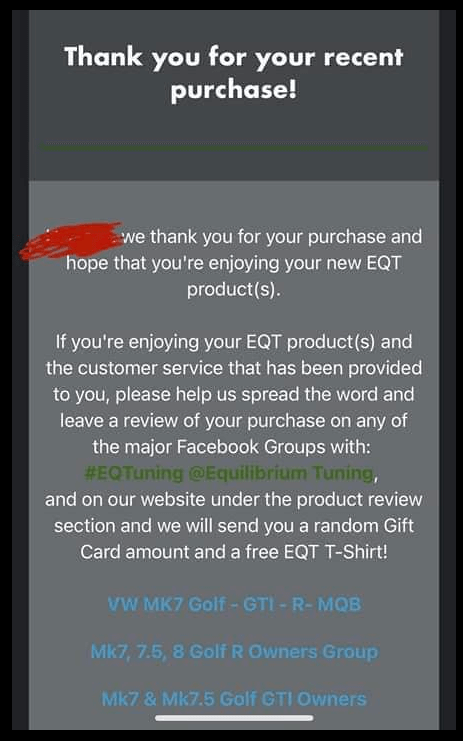
“When there exists a connection between the endorser and the seller of the advertised product that might materially affect the weight or credibility of the endorsement (i.e., the connection is not reasonably expected by the audience), such connection must be fully disclosed.” – FTC 255.5 Disclosure of material connections.
The connection between the endorser’s reviews and EQT’s compensation offer was not disclosed to consumers, as required by the FTC:


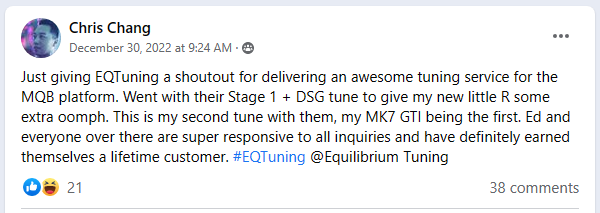
Nor does EQT indicate to consumers that reviewers have been compensated in the CUSTOMER REVIEWS section of their website:

The connection between the EQT compensation offer and the reviewer’s endorsement is not disclosed, preventing consumers from weighing this possible bias and creating a potentially misleading situation.
Questions:
A sudden rise of glowing reviews of EQT was questioned by some enthusiasts resulting in EQT owner Ed Susman responding to complaints about these reviews.

Ed avoids answering the question “Is EQT putting people up to this” by saying that EQT “just sent out an email to all our customers from boost weather sale“.
Here he omits the fact that they did put people up to making reviews because the email includes an offer to their customers of a “random Gift Card amount” and “a free EQT t-shirt” as compensation for giving a public endorsement.
Not an issue for anyone:
Ed then gave more explanations:
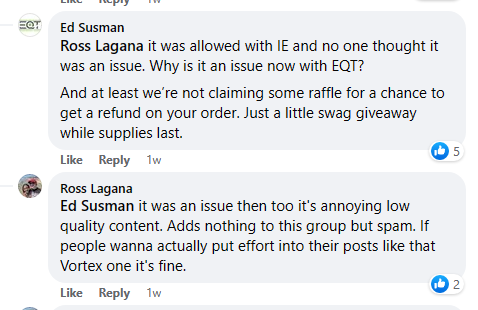
Ed employs a Quantification Fallacy (logical fallacy), which is in the form of a Universal Quantifier; “no one thought it was an issue.” This is an impossible claim to validate. Some people might not have thought it was an issue, but it would be impossible for Ed to determine how all people thought about the matter.
Note: The Quantification Fallacy is an error in logic where the quantifiers of the premises are in contradiction to the conclusions quantifiers.
Stayed out of the discussion:
Ed’s statement that “it was allowed with IE and no one thought it was an issue” is challenged by a claim that he was involved with the posts that questioned IE’s advertising.

Looking at one of the IE Review Posts shows Ed did not stay out of the discussions:
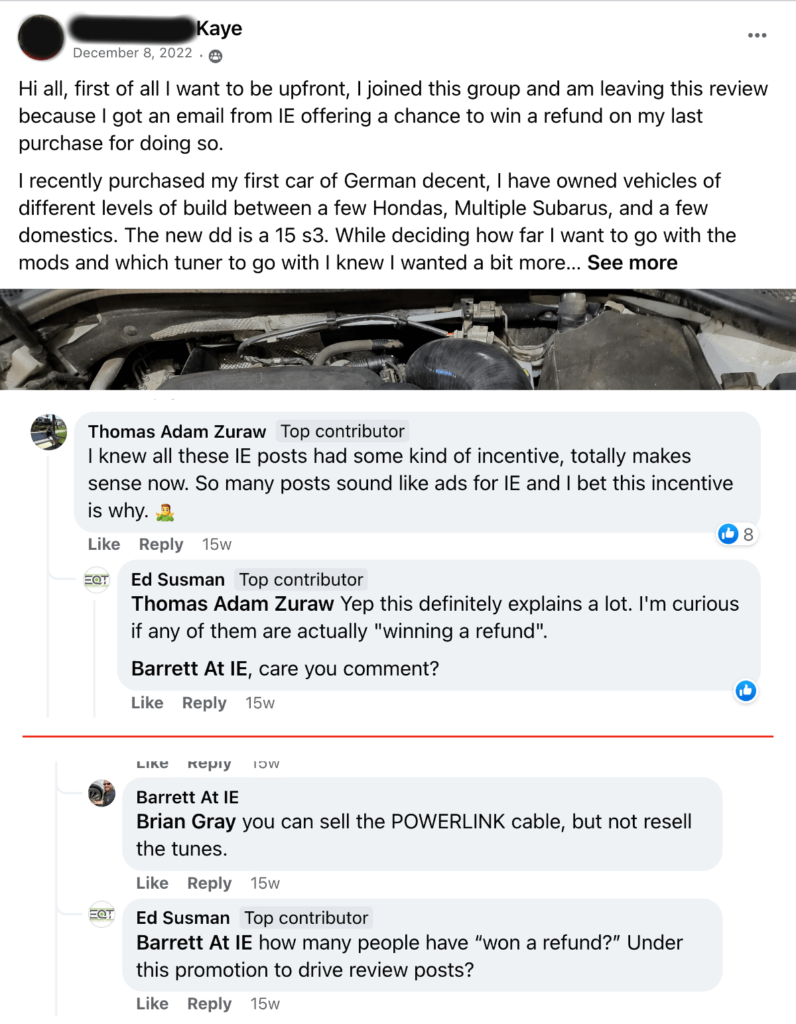
Ed uses this discussion to call out an employee of a competitor’s business to answer questions he has about how that business is handling its promotion and how many of the business’ customers have received refunds.
This evidence contradicts Ed’s claim that he “stayed out of those posts”, indicating his statement was false.
Note: EQT’s owner questioning a competitor’s employee violates the group rules.
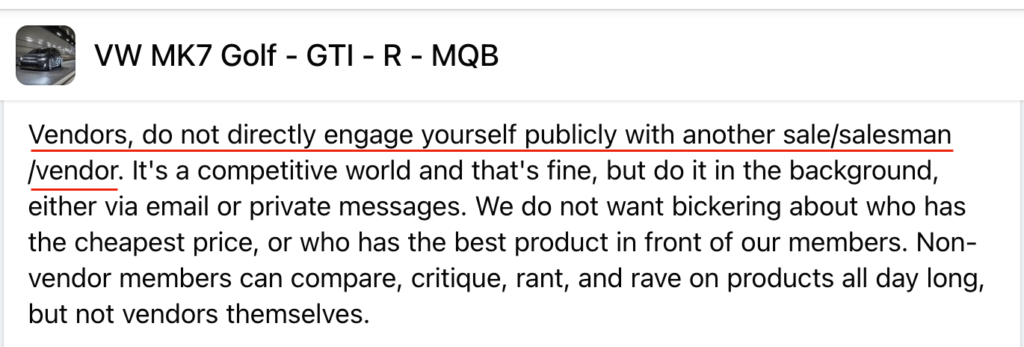
Everybody does it:
In a different exchange, Ed states that everybody does it.

Rather than considering how ethical, or in this case legal, the actions of his business are, Ed gives an explanation of: “seems to be standard practice with all the other companies”, which is an example of the Hasty Generalization fallacy
The Hasty Generalization fallacy is the logical fallacy of making a claim based on a sample size far too small to support the claim. (IE is the only other example Ed provides of all the other companies).
Claiming that paid reviews are standard practice with all the other companies is another use of the Quantification Fallacy. It is improbable that all the other companies are providing compensation to customers to give positive reviews.
Only want honest reviews:
Ed explains in another exchange:

The logic of Ed’s statement is again, somebody else did this type of thing, so it’s alright for my business to do it, reinforcing the impression the business owner lacks an awareness of what ethical and legal marketing consists of.
Ed’s statement that “we’re only asking for honest reviews” had me reflecting on the paid-endorsement campaign sentence “If you’re enjoying your EQT product(s) and the services that have been provided to you,…”
The words “If you’re enjoying…” will create a bias of positive reviewers. Coupled with the offer for compensation, the resulting large number of positive reviews is not surprising.
Hypothesis:
I hypothesized that Ed’s statement about “only asking for honest reviews” was false and that EQT only wanted positive reviews.
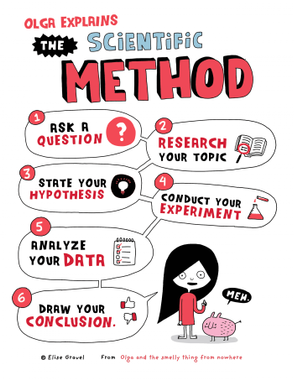
I thought about the inquiry email I’d sent to the business six weeks prior asking about the Blaze intake, to which I had never received a reply.
I thought I don’t think they have good customer service, they never replied to my inquiry, and since Ed says he’s just “asking for honest reviews“, I’m going to test my hypothesis by posting an honest review stating my dissatisfaction with their lack of response.

Ed’s response is to try to discredit my questions and my review, evidence refuting his claim that EQT was just asking for honest reviews.
From this evidence, I concluded that my hypothesis was correct.
Because my review included a statement that EQT has not substantiated its claims I supported my statement with evidence in a second post.
This second post contained a link to my analysis of the EQT performance claim compared with Federal Trade Commission laws regulating business marketing in the United States.

Making the two posts led to reactions that point to the strong influence that EQT’s marketing techniques have on social media users.
Conclusions for future reference:
- EQT conducted a paid-endorsement campaign that was biased to produce positive customer reviews of the business.
- EQT’s paid-endorsement campaign lacked disclosures to consumers required by the Federal Trade Commission for compensated reviews.
- EQT owner Ed Susman responded to complaints about the paid endorsements using multiple Logical Fallacies (an error in reasoning that renders an argument invalid).
- Ed Susman responded to complaints about the paid endorsements with statements that omit important facts.
- Ed Susman’s claim to have “stayed out of those posts” concerning IE’s marketing was shown to be false.
- Ed Susman’s questioning of a competitor’s employee about the competitor’s promotion campaign violated the group rules for vendors.
- Ed Susman’s claim to be “only asking for honest reviews” was shown to be false.
- Ed Susman acted to discredit the person posting an honest review of EQT that was not positive.
The effect of these actions is to present consumers with an unbalanced favorable picture of EQT while marginalizing the significance of concerns voiced by consumers about the business’s actions.

Next:
Additional actions by Equilibrium Tuning personnel to manipulate consumers will be the subject of a series of future posts.

I used to recommend eqt to people without a second thought but their behavior has me thinking twice